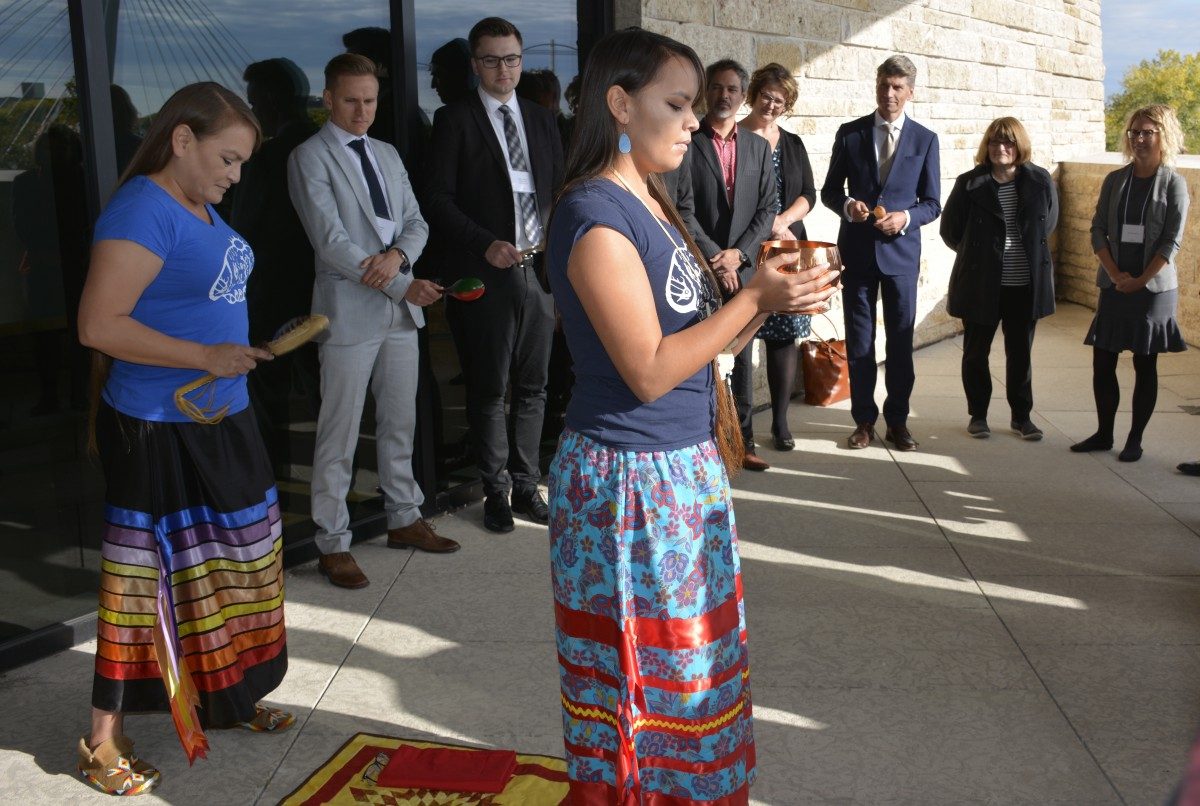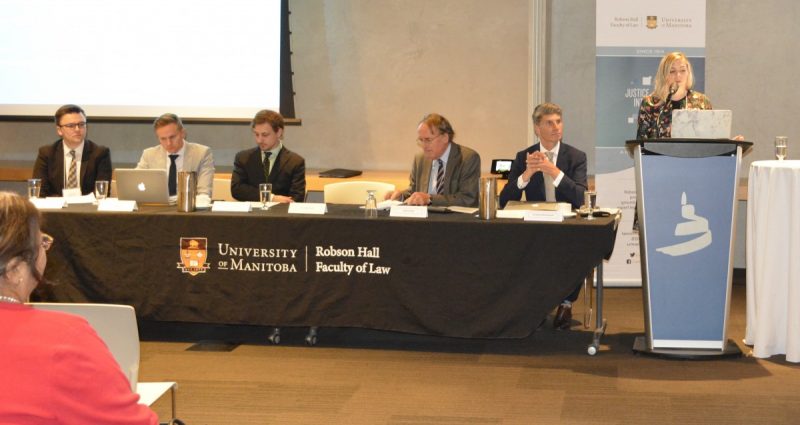
International Legal Community Find Winnipeg a Centre for Nuclear Peace
Coinciding with the United Nations’ International day of Peace and the declared year of “Peace,” which celebrated the 70th anniversary of the Universal Declaration of Human Rights, Dr. Jonathan Black-Branch, Dean of Law, organized an international conference regarding challenges posed by nuclear weapons. For the second year in a row, the conference, hosted by the University of Manitoba’s Faculty of Law and open to the public, was about Nuclear Non-Proliferation and Disarmament, with this year’s focus being on regional controls, defence and diplomacy. Most continents were represented with speakers coming from New Zealand, Australia, South Africa, Spain, Switzerland, Germany, Japan, the US and Canada, sharing their respective regional comparative perspectives. The conference was opened by University of Manitoba Elder-in-Residence, Norman Meade, and included a Water Ceremony and Smudge shared by Knowledge Keeper Ramona Bird and her daughter, Alyssa Bird, who is a third-year law student at Robson Hall.
As living examples of the law in action for peace and security, some of the world’s leading scholars in nuclear non-proliferation law and disarmament gathered in Winnipeg at the Canadian Museum for Human Rights on September 20 – 21. Dr. Black-Branch convened the conference on the United Nations’ International Day of Peace in the year of “Peace” to highlight the nuclear threats and challenges facing humanity.
Dr. Black-Branch opened the conference calling for leadership in this important area stating that we are at a “cross-roads as to the way forward. What is decided in the coming years will surely shape our approach to nuclear disarmament issues for the coming century”. The Honorable Marilou McPhedran, independent senator in the Parliament of Canada, questioned “How do we get Canada back to a non-nuclear future?” Dr. Monique Cormier, from the University of New England in New South Wales, Australia, explained Australia’s position on the 2017 United Nations Treaty on the Prohibition of Nuclear Weapons. Joining the conference from Johannesburg, Dr. Yolandi Meyer shared a reflection on South Africa’s position, including how it came to dismantle its nuclear weapons program. Manitoba-born architect and urban planner now living in Tokyo, Dr. Will Galloway, shared concrete examples of what a nuclear disaster looks like, from his experience living in Japan during the 2011 earthquake and tsunami that destroyed the Fukushima nuclear power plant, and the logistics problems and hardships encountered by a city of so many millions of people. Other very distinguished international speakers brought a multitude of interesting perspectives on non-proliferation and the treaties currently in place.

Robson Hall Law Students present research papers before an audience of international experts. Left to right: Carter Liebzeit, Jason Poettcker, Brayden McDonald, Dr. Dieter Fleck, Dr. Jonathan Black-Branch, Amy Robertson
A panel of Robson Hall law students had an opportunity to present papers on different topics, and were met with challenging questions from the international legal community of experts before them. The students each rose to the challenge and defended their papers admirably.
Dr. Jonathan Black-Branch, was the central mechanism making the conference happen, with his extensive involvement in and passion for the field of nuclear non-proliferation law. An educator as well as a lawyer, he especially wanted student involvement and public involvement to both raise the next generation of lawyers’ awareness of the importance of this topic, and to revitalize and encourage the current community of experts with student perspectives.
As Chair of the Committee on Nuclear Weapons, Non-Proliferation and Contemporary International Law of the International Law Association, Dr. Black-Branch, a leading legal expert in the area, has convened six Round Table Forums and various research conferences on these topics around the world. The most recent was held in Sydney, Australia in August, 2018. Dr. Black-Branch is the founding President of the International Society of Law and Nuclear Diplomacy and Disarmament and was the British representative to the International Law Association’s Arms Control and Disarmament Law Committee. He is the co-editor of the refereed journal series on Nuclear Non-Proliferation in International Lawpublished by Asser Press with Volume IV in press, along with Dr. Dieter Fleck, a leading expert in the area on International Law.
The conference was presented in collaboration with the International Law Association’s Committee on Nuclear Weapons, Non-Proliferation and Contemporary International Law in conjunction with the Round Table Strategic Forum on Nuclear Non-proliferation in International Law. The purpose of the conference was to assess outstanding legal problems with a view to identify general legal obligations for States to adhere to. This included looking at principles and rules on the nuclear law regarding disarmament and non-proliferation and the need for regional solutions to address control of nuclear energy, including for peaceful purposes and further limitations to conventional weapons under international humanitarian law.
Dr. Black-Branch concluded the conference with a working session to finalize a “Winnipeg Declaration,” taking advantage of the presence of the expertise in the room to establish thirteen pillars (representing the 13 phases of the moon as described in Elder Meade’s opening teaching), asking countries of the world to respect the rights of human beings to live free from the fear of nuclear weapons and threats and to take responsibility for any suffering that occurs as a result of nuclear disaster. The Declaration also, at its core, promotes the movement toward complete and verifiable disarmament.






